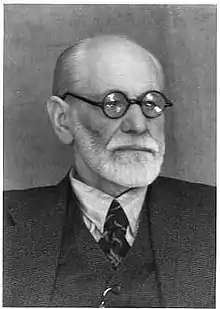Psychodynamic psychology
Psychodynamic psychology is a branch of psychology that helps us understand how our minds work and how our thoughts and feelings can shape our behavior. It explores the hidden and sometimes unconscious aspects of our minds to uncover the reasons behind our actions and emotions.[1]
  | |
| One of the most famous figures in psychodynamic psychology is Sigmund Freud. |
Key Concepts
Unconscious mind
Psychodynamic psychology believes that a big part of our mind is like an iceberg – much of it lies beneath the surface, hidden from our awareness. This hidden part is called the unconscious mind. It contains thoughts and feelings that we might not be aware of, but they still influence how we behave.
Sigmund Freud
One of the most famous figures in psychodynamic psychology is Sigmund Freud. He came up with many ideas that help us understand our minds better. Freud believed that our early childhood experiences shape our personalities and how we interact with the world.
Id, ego, and superego
Freud also introduced the idea of the mind being divided into three parts – the Id, Ego, and Superego. The Id is like our basic instincts, the Ego helps us make decisions, and the Superego is like our moral compass.
Dream Analysis
Psychodynamic psychologists often analyze dreams to learn more about the unconscious mind. Dreams can be like a window into our thoughts and feelings that we might not be aware of when we're awake.[2]
Defense mechanisms
Psychodynamic psychology talks about defense mechanisms – ways our minds protect us from things that might be too difficult to handle. Examples include denial (refusing to accept the truth) and repression (pushing uncomfortable thoughts into the unconscious).[3]
Applying psychodynamic ideas
Psychodynamic psychology is not just about understanding our minds; it's also about helping people. Psychologists use these ideas to help individuals explore and understand their emotions, thoughts, and behaviors. This self-awareness can lead to positive changes in how we approach challenges and relate to others.[4]
Conclusion
In a nutshell, psychodynamic psychology helps us dive deep into the mysteries of our minds. By exploring the unconscious and understanding how our early experiences shape us, we can gain insights that contribute to personal growth and a better understanding of ourselves and those around us.